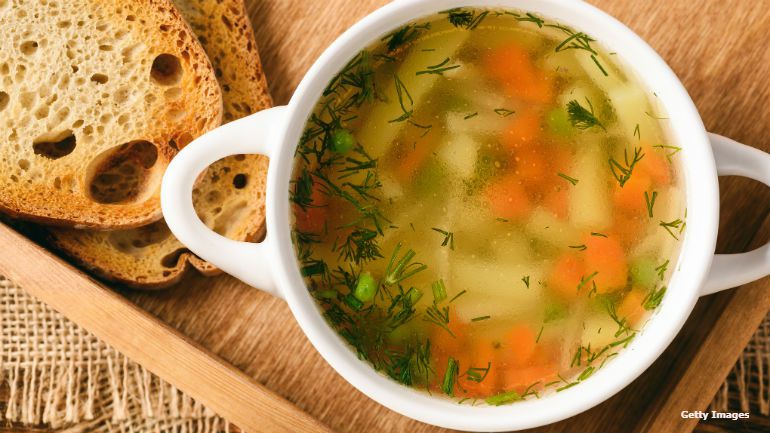We all know the grandmotherly wisdom of serving chicken soup to someone with a cold, but does this particular meal really have medicinal properties? Could slurping up chicken soup save me a trip to the local pharmacy?
You won’t find studies in humans that prove chicken soup can fight a cold, but there’s enough evidence to make it worth trying.
One study published in the medical journal Chest suggested that chicken soup might have anti-inflammatory effects, which could possibly ease symptoms of upper respiratory tract infections.
Researchers specifically studied the movement of neutrophils — a type of white blood cell — when combined with soup. They found that the movement of neutrophils was reduced in the presence of soup, suggesting a possible anti-inflammatory mechanism that could at least theoretically alleviate cold symptoms. Or not.
“There are substances (in chicken soup) that could affect cells in the body, that could potentially have medicinal effects, but whether they are good or bad for you, we didn’t test,” said study author Dr. Stephen Rennard, Larson professor of medicine at the University of Nebraska Medical Center in Omaha.
Because the study was done in a laboratory and not in humans, Rennard cautions that it remains to be seen whether one would even absorb the substances that appeared to have beneficial effects in the lab.
The researchers did not actually isolate specific substances in soup that might be beneficial, “nor did we show what it would do in a living person, let alone a living person with a cold,” he added.
“Chicken soup might do stuff … but lots more research is required,” Rennard said. “There is some possibility that there is a biochemical or medicinal basis to it … but ‘some,’ ‘suggests’ and ‘possible’ are the key words.”
Hot chicken soup was more effective than hot water in stimulating something known as the mucociliary transport system, which helps move things along in the upper and lower respiratory tract, allowing the body to rid itself of particles and infection.
“The mucociliary transport system is important for getting rid of every respiratory infection, including colds,” Saketkhoo said. “Whatever can make airways clear up faster may decrease risk of infection or clear an existing infection.”
Sipping hot fluids helps to warm the bottom of your nasal pharynx, which can also help improve symptoms, Saketkhoo explained. This might explain why cold water was least effective in the study. But the study suggested that there’s something in chicken soup that gives it an edge.
Saketkhoo cautioned that his study made no health claims or definitive conclusions about chicken soup, though his community seemed quick to embrace his findings. “I heard there was a product being marketed as ‘Mount Sinai chicken soup’ years ago,” he said.
Studies aside, experts agree that chicken soup is worth trying you’re when sick and can come in handy when eating a solid meal feels like too much.
“Chicken soup can offer a nutrient-dense food option when someone is struggling with a poor appetite,” said Kristen Smith, a registered dietitian and spokeswoman for the Academy of Nutrition and Dietetics. “It can also help increase hydration during a time when this could be a challenge.”
Most chicken soups contain ingredients that provide lots of vitamins and minerals, according to Smith. For example, carrots provide your body with vitamin A, a nutrient that plays a role in the immune response, and chicken stock contains zinc, which may help fight a cold when consumed in high amounts. Chicken may help with the repair of body tissue and contains the amino acid cysteine, which some researchers are exploring for improving colds in supplement form, though Smith cautions that “most homemade and canned varieties would probably not provide adequate amounts to offer benefits.”
There is also the notion that collagen from bone broth or stock can help with healing, “but the current scientific evidence to support this theory is lacking,” Smith said.
Of course, the environment in which chicken soup is often eaten helps, too.
“My wife (who prepared the soup for the study) makes the point that when you are feeling ill, if someone is taking care of you, that tender loving care is not a placebo effect,” Rennard said. “There are clearly beneficial effects of that. So if someone is sitting there and making you chicken soup, it may make you feel better … but whether it has to do with contents of the chicken soup may be irrelevant.”
Saketkhoo said, “does it cure the cold? Of course not. But does it help people with a cold feel better? I think it does … and so that’s why we give hot fluids, including chicken soup, to people with colds.”
The best treatment for the common cold, according to Saketkhoo, is good nutrition, enough bed rest and hot fluids. “And if you like chicken soup, then let it be chicken soup,” he added.












